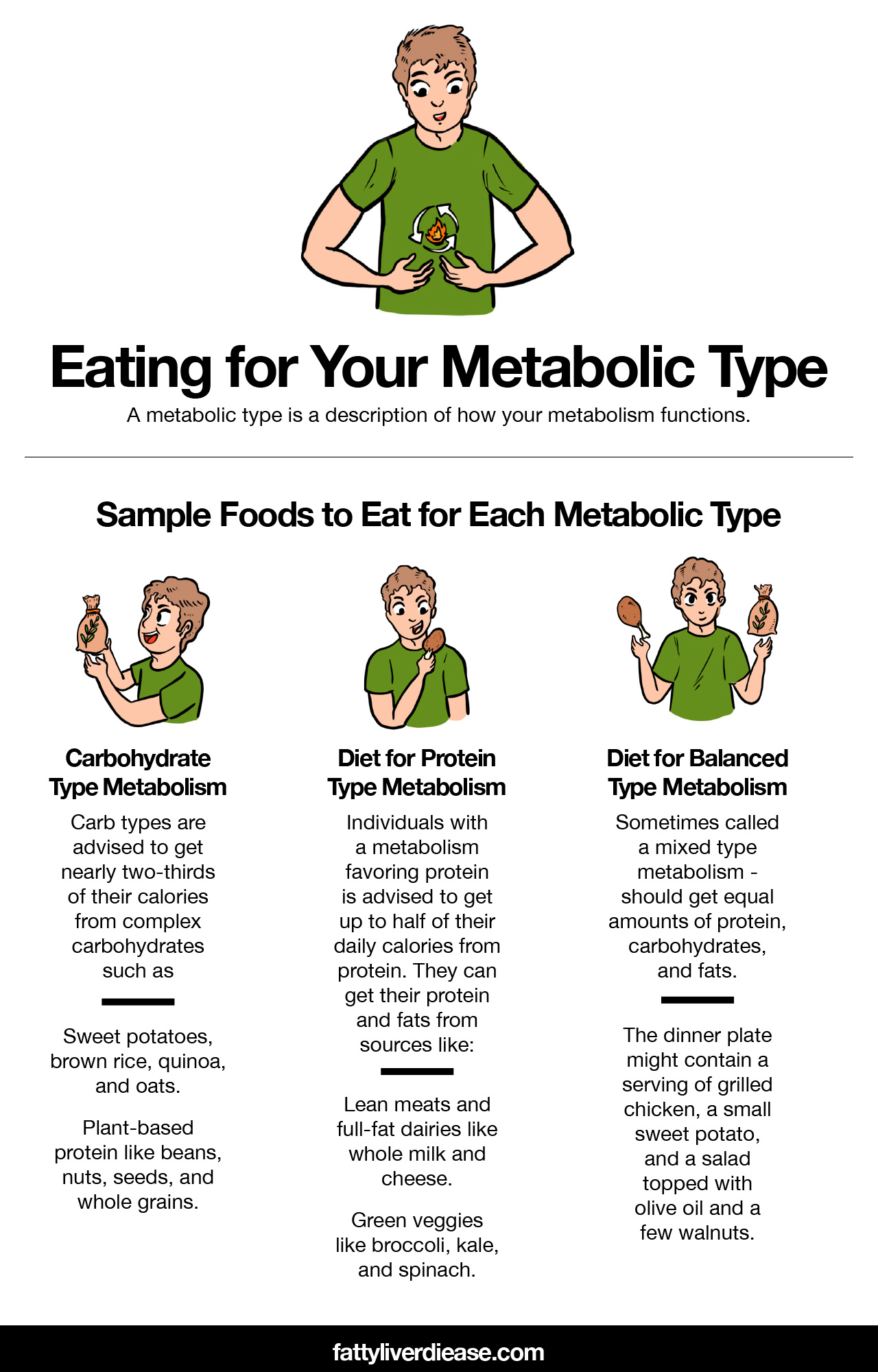Amidst all of the fad dieting plans, it’s not easy to know what’s right for you. Many diets emphasize the importance of individualizing your food to fit your needs, and the metabolic type diet is one of those diets. This can be particularly enticing for people who are struggling with metabolic conditions, like obesity, insulin resistance, type 2 diabetes, and fatty liver disease. So, let’s find out if eating for your metabolic type just another fad diet concept, or a diet method based on hard evidence.
What Is a Metabolic Type?
A metabolic type is a description of how your individual metabolism functions. Depending on your metabolic type, your body requires varying ratios of the macronutrients including protein, fats, and carbohydrates in order to promote good health, optimize energy levels, and facilitate weight loss.
The history of metabolic typing relies on the work of nutrition researcher William Wolcott. Generally, the metabolic type is determined using a questionnaire that evaluates appetite, cravings, caffeine dependency, and personality traits. Sometimes blood tests or urine tests are used.
Metabolic typing is not an exact science, but rather an examination of general trends. There is no consensus in the health and fitness world about the exact number of metabolic types.
There are several factors that play into your metabolic type, including the oxidation rate and autonomic nervous system function.
- Oxidation rate: The oxidation rate refers to how quickly the body is able to chemically break down food and convert it into a useable energy form. On a molecular level, oxidation means that compounds lose electrons. In cells, proteins, fats, and carbohydrates are oxidized to create energy sources.
- Autonomic nervous system function: The autonomic nervous system is a part of the nervous system that is responsible for controlling involuntarily bodily functions, including heart rate, breathing, and digestion. The autonomic nervous system can be further subdivided into the sympathetic and parasympathetic nervous systems. The sympathetic nervous system is responsible for the “fight-or-flight” response that causes an increase in heart rate, sweating, and stress hormones.
Based on the oxidizing rate and autonomic nervous system function, metabolism type diets are split into three main groupings.
- Carbohydrate type metabolism: Individuals that do better with more carbohydrates tend to have slower metabolisms. In metabolic typing theory, carb types have slow oxidating processes when converting food particles slowly into useable energy, and they’re sometimes called slow oxidizers. The sympathetic nervous system is the dominant branch of the nervous system in these metabolic types. Carbohydrates tend to be easier to digest, which aids in the efficiency of slower metabolisms.
- Protein type metabolism: Individuals with a protein metabolism tend to have a quicker metabolism and are considered to be fast oxidizers. These individuals’ nervous systems are dominated primarily by the parasympathetic nervous system. The protein type can more efficiently break down protein and convert it into useable energy.
- Balanced metabolism: Individuals with a balanced metabolism have equal contributions from the sympathetic and parasympathetic nervous systems. They are able to utilize both protein and carbohydrates effectively for energy.
Sample Foods to Eat for Each Metabolic Type
Based on the characteristics of each metabolic profile, individuals are advised to eat different proportions of foods.
- Diet for carbohydrate type metabolism: The metabolic typing guidelines advise carb types to get nearly two-thirds of their calories from carbohydrates. If you follow these guidelines, it’s important to make sure your carbohydrates come from complex carbs that come from whole foods such as sweet potatoes, brown rice, quinoa, and oats. Protein should come primarily from plant sources, like beans, nuts, seeds, and whole grains.
- Diet for protein type metabolism: The metabolic typing dietary guidelines advise that getting up to half of your daily calories from protein is optimal for individuals with this protein type metabolism. Metabolic typing dietary guidelines suggest that individuals with a metabolism favoring protein can get their protein and fats from sources like lean meats and full-fat dairy like whole milk and cheese. Protein types should limit their intake of starchy vegetables and focus on green veggies like broccoli, kale, and spinach.
- Diet for balanced metabolism: Individuals with a balanced metabolism – sometimes called a mixed type metabolism – should get equal amounts of protein, carbohydrates, and fats. For example, the dinner plate for the balanced metabolism might contain a serving of grilled chicken, a small sweet potato, and a salad topped with olive oil and a few walnuts.

Issues with Metabolic Typing
Though in theory, metabolic typing seems like a sound concept, there are gaps in the science backing it.
1. It Suggests that Metabolic Types Are Cookie-Cutter and Predictable
Metabolic typing allows for very little fluidity across the different types, and this doesn’t reflect the reality of variation that is present across the population. For example, if you determine that you have a metabolism favoring protein, the macronutrient breakdown of consuming mostly protein and fewer carbohydrates and fats may not be effective for you. If you’re an athlete, you will certainly require more carbohydrates than is recommended for the protein-favoring metabolic type. In cases like this, it’s important to make adjustments to suit your needs.
2. Genetics Are Highly Variable
Think about how much variation exists in physical appearance and personality type across all human beings. This same diversity in characteristics can be applied to biochemistry. It’s unrealistic to stick humans into boxes regarding metabolic type.
3. Environmental Factors Impact Genetics
In addition to genotypic factors, environmental influences play a critical role in your metabolism and your risk of gaining weight and developing metabolic conditions. In fact, environmental factors interact with your genetics to impose genetic changes, referred to as epigenetic alterations. Epigenetics changes impact the way your genes are expressed and create even more variability across the population. Factors the influence genetic expression include stress levels, food intake, level of exercise, sleep patterns, and other lifestyle factors.
4. Metabolism is Unlikely to Be Tied to Personality
The metabolic typing concept makes generalizations about personalities for each metabolic type.
The metabolic typing theory suggests that individuals with a metabolism favoring carbohydrates tend to be more motivated and stressed, with strong cravings for sugar. Individuals with a metabolism favoring protein tend to be extraverted, struggle more with exhaustion, and have strong cravings for savory, salty, or sour foods like pickles. Those with a balanced metabolism lie somewhere in the middle.
However, there is little evidence to suggest that such generalizations about personality and moods hold true. In line with #2 and #3, the vast variation in genetics and environment make it extremely unlikely that there are personalities tied to varying metabolic functions.
5. Most Humans Respond to a Healthy Diet and Exercise
Despite the genetic and environmental variation across the population, most people readily respond to a healthy diet based on whole foods and an active lifestyle. Sorting individuals by metabolic type can be arbitrary and doesn’t take into account other relevant factors like activity levels, immune health, gut health, endocrine function, and even medications.
6. Research for Metabolic Typing Is Lacking
Research backs the idea that indicators of metabolic function and risk for metabolic conditions do vary across the population. For example, the likelihood of developing health conditions like type 2 diabetes, fatty liver disease, and high blood pressure is higher if your parents or close family members also have the condition.
However, there is very little research and very few randomized controlled trials that directly evaluate the efficacy of metabolic typing diets for weight loss.
One small-scale study published in the New Zealand Journal of Sports Medicine examined the relevance of the metabolic typing diets for a sample of five rugby players. (1) Researchers administered the metabolic typing questionnaire and performed laboratory tests to evaluate biological indicators of metabolism. Results established no connection between questionnaire answers and laboratory tests, and researchers concluded that metabolic typing doesn’t seem to have any relevant application for athletes. (1)
It seems unlikely that using a questionnaire to establish your metabolic type would yield reliable results, and it makes much more sense to rely on biochemical tests. However, for most of us, getting biochemically tested is unrealistic.
In contrast to metabolic typing, other diets like the low-carb diet, low-fat diet, paleo diet, plant-based diet, and others are prevalent in the scientific literature. A wealth of peer-reviewed, high-quality studies yield helpful information about diet and metabolism, without distinguishing between metabolic types.
6. Guidelines May Not Always Beneficial and Could Be Misleading
Let’s first take a look at the protein type. Research has never revealed that a diet high in saturated fats and red meat is more beneficial than a more balanced diet or a plant-based diet. In contrast, the opposite has been established in the scientific literature. Saturated fats from animal products interfere with insulin function and worsen insulin resistance. Moreover, saturated fat is a causal factor in high cholesterol levels, which contribute to the formation of plaques in the arteries. High cholesterol and high triglycerides worsen systemic inflammation, contribute to weight gain, and exacerbate metabolic conditions like obesity, type 2 diabetes, and fatty liver disease.
If someone identifies with the carb type metabolism, this could lead to their decision to consume less protein than they actually need. Inadequate protein intake can lead to suboptimal consumption of the essential amino acids found in protein that are needed for muscle synthesis and immune system health. If a carb type is an athlete, they most likely need both a high-protein and high-carb diet to support workouts and post-workout recovery and muscle growth.
How Metabolic Typing Can Be Helpful
The list above isn’t to say that metabolic typing can’t be helpful at all. In some ways, establishing your metabolic type may be useful for tailoring your diet and exercise plan. Metabolic typing can provide a general template for analyzing your tendencies and testing how different foods affect how you feel.
Metabolic typing is a tool that you can use for weight loss, and it may help you uncover what’s sustainable and effective for your journey. To assess how different foods may impact your energy and weight, try keeping a food journal. Record the foods that you eat each day and make a few notes on how you’re feeling that day.
Over time, you may begin to notice a pattern. Perhaps you feel the most energized when you eat a breakfast loaded with healthy carbs. Or, maybe you respond best to a protein-rich breakfast. Some people like eating more frequent, lighter meals throughout the day, while others do best with the traditional three square meals. Whatever your metabolic type, you will have individual preferences and sensitivities that influence what foods are best for you.
Body Typing Is Related to Metabolic Typing
Another individualized diet idea that is connected to metabolic typing is body typing and following a body type diet. The idea is based on the premise that all individuals fall into one of three categories: endomorphic, ectomorphic, and mesomorphic body types.
Metabolic Flexibility Is a Better Goal
What is likely more relevant is the idea of metabolic flexibility. Research shows that having metabolic flexibility is important in preventing cancer and disease and keeping inflammation levels low. (2)
Metabolic flexibility also plays a role in preventing weight gain and preventing the development of metabolic conditions. Mitochondrial health helps determine metabolic flexibility. Mitochondria are the organelles present in each cell that are responsible for converting food into energy. Striving for a healthy metabolism that can adapt to changing environmental factors is the best way to support your health, regardless of your metabolic type.
Dietary Guidelines for Metabolic Flexibility
You can support mitochondrial health and metabolic flexibility by eating a diet rich in whole foods that provide a balanced supply of healthy fats, carbohydrates, and protein with optimal ratios of amino acids. Micronutrients like vitamins, minerals, fiber, and antioxidants help metabolic processes function by clearing oxidative stress and lowering inflammation. You can also promote healthy metabolic functioning by stabilizing your blood sugar levels. In order to keep blood sugar within a healthy range, avoid added sugar and refined grains in products like candy, soda, cookies, cakes, chips, crackers, ice cream, and doughnuts.
Avoiding fatty foods that are high in unhealthy saturated and trans fats is another key to supporting metabolic health and flexibility. Stick to polyunsaturated and monounsaturated fats that are found in plant-based fats and fatty fish. Healthy fats protect cell structure, support mitochondria, and decrease inflammation, resulting in more effective cellular processes.
Finally, support your metabolism with ideal ratios of essential amino acids. The human body requires all nine of the essential amino acids in specific ratios on a daily basis. Lean animal proteins provide optimal ratios of essential amino acids. To get essential amino acids from plant-based proteins, combine a variety of plant-based foods throughout the day. To eliminate inconvenient guesswork and protein-pairing, opt for an essential amino acid supplement.
Conclusion
Don’t rely on metabolic typing as the end-all, be-all in weight loss strategies. Metabolic typing is not strongly supported by science and should be used with caution. Simply use metabolic typing as a guideline as you try out different foods that work best for your needs. To determine your metabolic tendencies, it’s always best to visit your physician and nutritionist. Regardless of metabolic type, all of us benefit from a diet that emphasizes a diet rich in complex carbohydrates, healthy fats, optimal ratios of essential amino acids, vitamins, minerals, and antioxidants. We also all benefit from a diet low in added sugar and processed foods. Your metabolic ID is just one part of a much more complex, integrated puzzle.
References:























